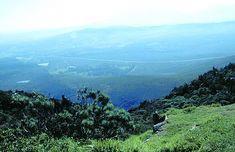
A social enterprise that provides business guidance and support to producers in developing countries has begun importing fruit at London’s New Spitalfields Market. All profits go towards helping African growers tackle poverty in the region.
Sahara Communities Abroad (SACOMA) Community Services is dedicated to the supply of ethical produce and better prices, decent working conditions, local sustainability, and fair terms of trade for farmers and workers in the developing world.
The charity focuses on working with people from sub-Saharan Africa and buys bananas, avocados, oranges, pineapples, mangoes, grapefruit, apples, pears and green beans from Kenya to raise money.
However, it is unable to source all its produce directly from there and instead buys ethical fruit from the EU and other countries that can be sold at more competitive prices.With the money raised, African small-scale farmers are being taught modern production techniques such as harvesting, storage, packing and transportation skills.
The training also covers quality control, sorting, grading and packing to support the marketing process. It is designed to increase productivity, reduce the costs of production and increase profit margins.Poor production, harvesting and handling methods all lower quality of the product and have a negative impact on prices.
CEO of SACOMA Fresh Fruit, Perez Ochieng, says there is a lot that needs to be done in order to improve supply chains.“If you compare farmers in Africa to Europe, the logistics is a whole new challenge. Airfreight is the biggest problem but also Europe is much more organised. The farmers in Africa are not necessarily trained,” she says.“We pushed together a couple of co-operatives and there are a whole load of issues we have to address because they have never exported before. But the farmers are poor. We need to be able to give them a better standard of living.”
The organisation is working with stakeholders to address these obstacles. The majority of farmers are women and it is also working to improve standards of living for women and reduce their vulnerability in their communities.In the future, SACOMA hopes 90 per cent of its imports will be ethical trade goods from Africa, but currently only 20 per cent of its produce comes from there.
While its other projects, such as its work to help people suffering from AIDS, have funding from the government, it is still seeking funding for its fresh food projects.
SACOMA was established in 2000 to support Kiswahili-speaking communities from sub-Saharan Africa living in the UK, many of whom are experiencing disadvantage, such as poverty, social isolation and discrimination.
It aims to empower, inform and educate members of the Kiswahili community to enable them to overcome disadvantage and social exclusion and effectively participate in the social and economic regeneration of marginalised communities in the UK.
The main purpose was establishing an enterprise that would serve the education and welfare needs of people from sub-Saharan Africa and elsewhere, particularly Kiswahili speakers living as immigrants in the UK. -